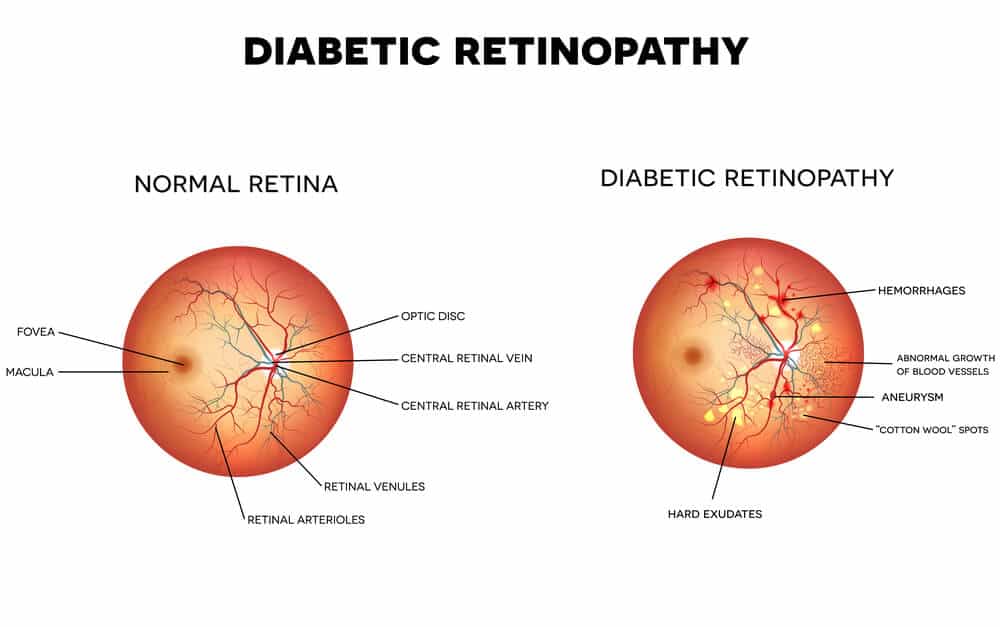Diabetic Retinopathy

Have you or someone you love recently found out you have diabetic retinopathy? Diabetic retinopathy is just one of the many retina conditions that the talented team at Retina Associates of Middle Georgia treats.
What is Diabetic Retinopathy?
Diabetic retinopathy is an eye condition that can affect people with diabetes. If you have diabetes, having irregular blood sugar levels can cause damage to blood vessels in the retina.
These blood vessels may increase in size, swelling, leaking, or closing off entirely, making blood unable to pass through. Diabetic retinopathy may also result in the growth of new abnormal blood vessels on the retina.
There are two main stages of diabetic retinopathy: non-proliferative diabetic retinopathy (NPDR) and proliferative (PDR).
Proliferative Diabetic Retinopathy
Proliferative diabetic retinopathy is the more advanced stage of diabetic eye disease. Diabetic retinopathy moves into this more advanced stage when the retina develops new blood vessels.
When this happens, it’s called neovascularization. During neovascularization, the new blood vessels frequently bleed into the vitreous. The new blood vessels are usually very flimsy, and they may leak, causing further issues with your vision.
Some patients may see floaters, while others may notice that they’ve lost all their vision or central and peripheral vision. The new blood vessels may also result in the formation of scar tissue.
If there’s scar tissue, this may cause issues with the macula or even result in a retinal detachment.
Non-Proliferative Diabetic Retinopathy
Non-proliferative diabetic retinopathy is the early stage of diabetic retinopathy. During NPDR, tiny blood vessels in the retina leak, causing the retina and the macula to swell.
If blood vessels in the retina close off, macular ischemia occurs. Closed-off blood vessels may cause the formation of tiny particles called exudates in the retina, affecting your ability to see. Patients with non-proliferative diabetic retinopathy will have blurry vision due to these changes in the retina.
Are There Any Signs or Symptoms of Diabetic Retinopathy?
If you have diabetic retinopathy, you may not realize it at first. Many of the signs and symptoms of this eye condition are virtually undetectable in the early stages. As it continues developing, you may start noticing symptoms like the following:

• Blurry vision
• Seeing an increase in the number of floaters
• Your vision changes from blurry to clear
• Seeing blank or dark areas in your field of vision
• Vision loss
• Seeing colors as more washed out or faded than before
When you start experiencing diabetic retinopathy symptoms, they typically affect both of your eyes.
How Do You Treat Diabetic Retinopathy?
After your eye doctor diagnoses you with diabetic retinopathy, the next step will be treating it. At Retina Associates of Middle Georgia, we treat diabetic retinopathy using several methods.
Treating you will depend on the severity of your symptoms and what we see in your eyes. Options may include:
Anti-VEGF Injections
Using anti-VEGF injections to treat diabetic retinopathy helps reduce a protein called VEGF in the eye. VEGF is responsible for swelling in the retina and leaking blood vessels.
Using anti-VEGF injections helps block the protein and improves your vision. If you need anti-VEGF injections, you’ll have them once a month for three months. You may be able to decrease how often you get injections over time.
Vitrectomy
Another method of treating diabetic retinopathy is by having a vitrectomy. A vitrectomy is a procedure that removes the vitreous from your eye.
Removing the vitreous allows your eye doctor to remove existing scar tissue and clear any lingering blood. They then replace the vitreous with a substitute fluid.
Laser Photocoagulation
With laser photocoagulation, your eye doctor at Retina Associates of Middle Associates uses a laser to seal or destroy abnormal blood vessels in the retina. Laser photocoagulation can help stabilize vision and prevent further vision loss from occurring.
Learn more about diabetic retinopathy and the best way to treat it by scheduling an appointment at Retina Associates of Middle Georgia in Macon, GA.